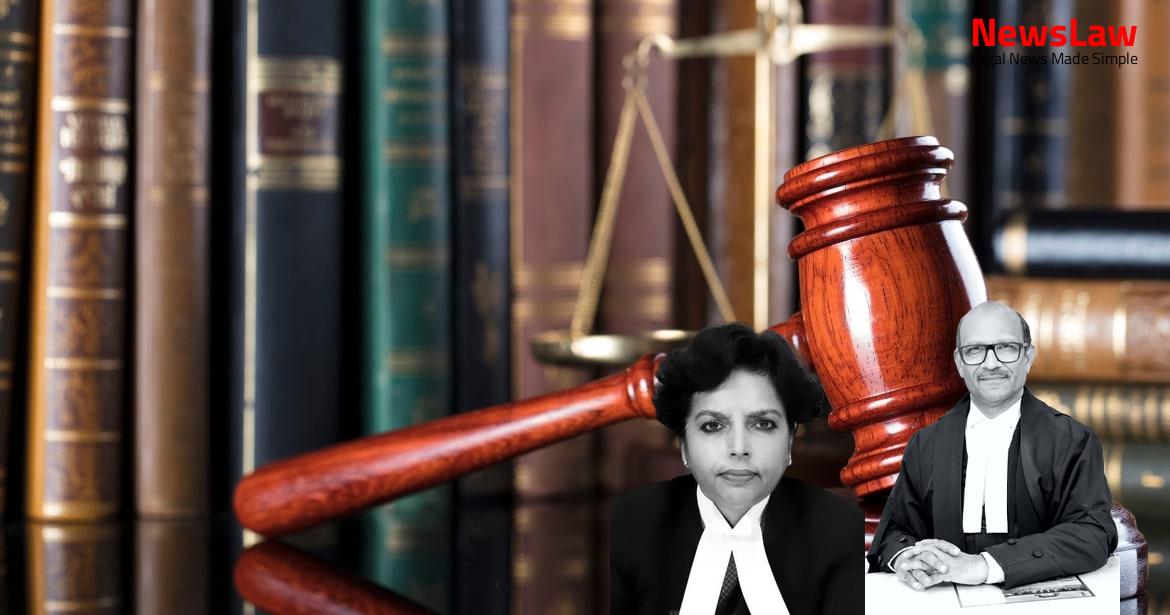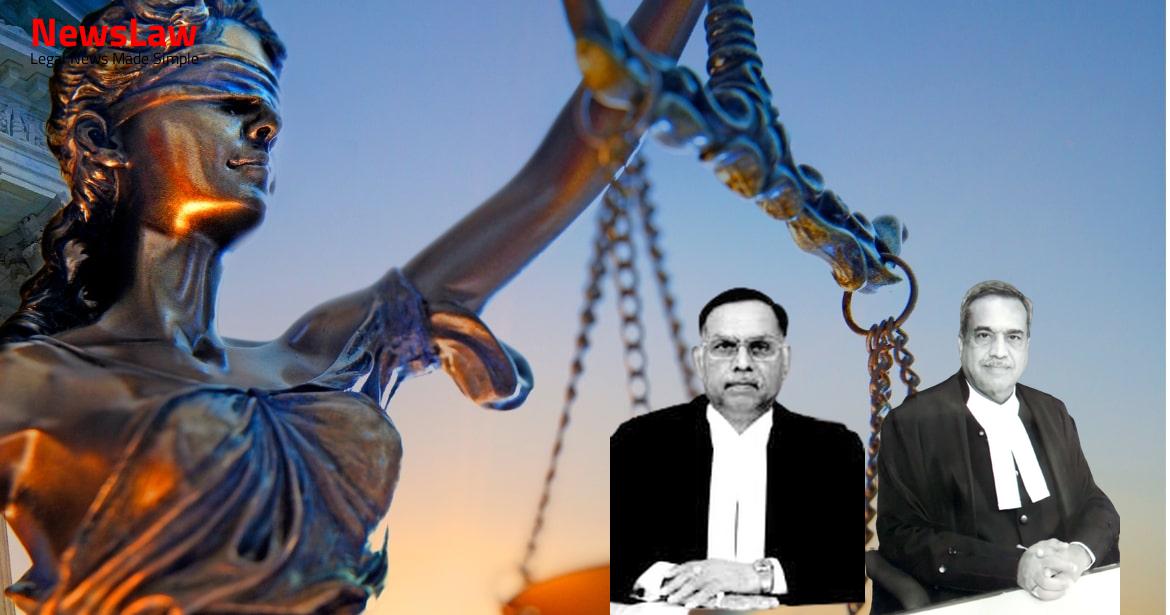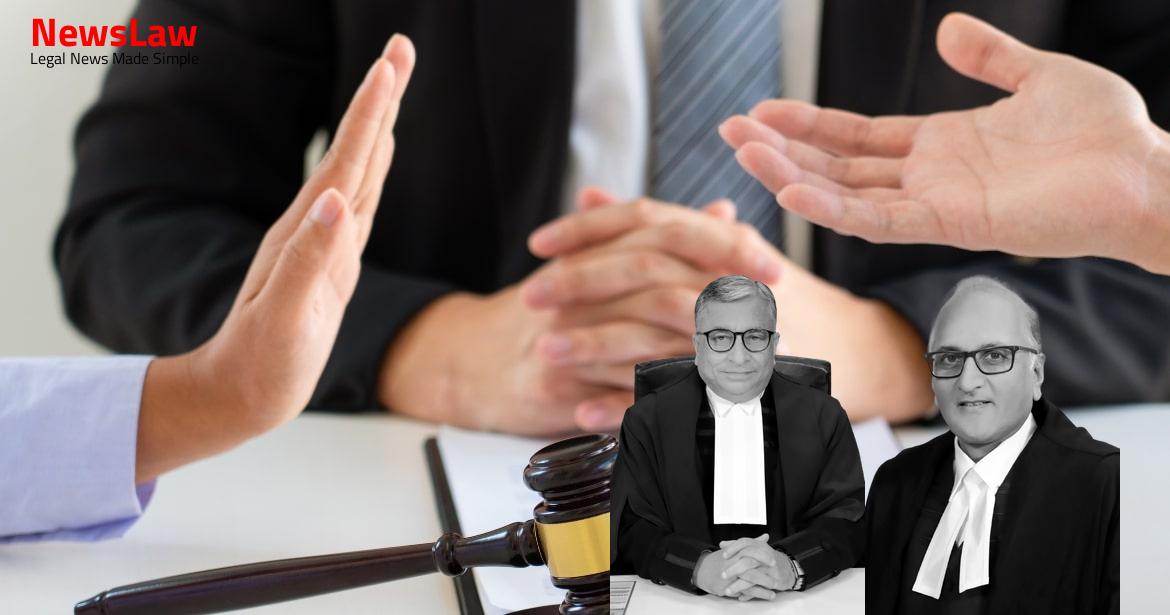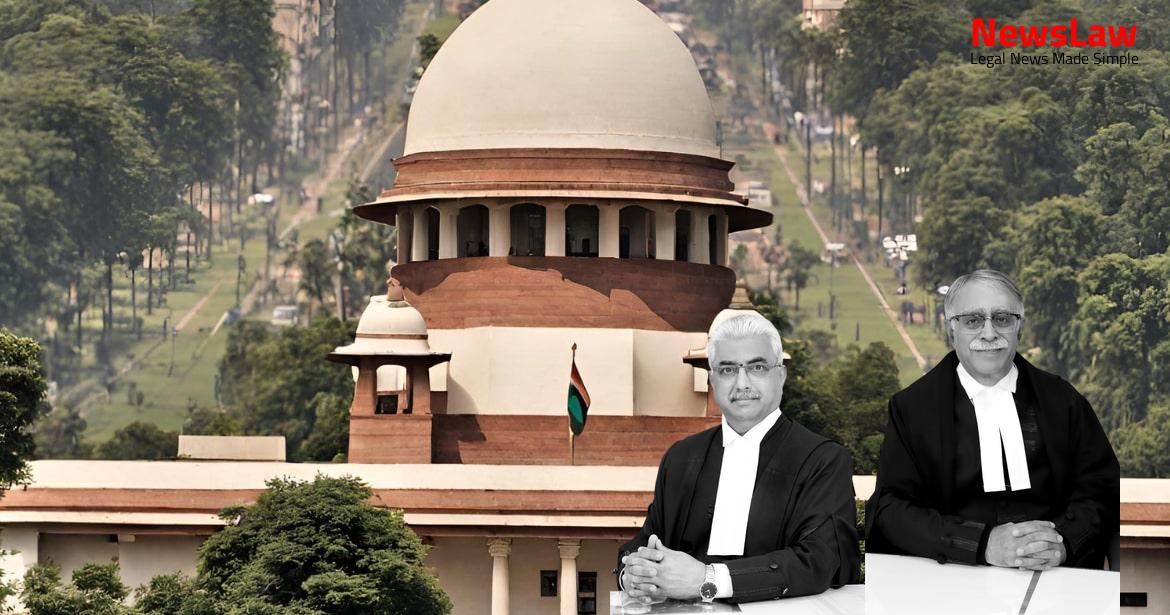In a significant ruling by the Supreme Court of India, a judgement was delivered on the case involving allegations of bribery. The case revolved around the demand and acceptance of illegal gratification by a public servant. The Court’s decision addressed crucial aspects of proof and presumption in such cases, shedding light on the intricacies of the law. This summary provides insights into the key arguments and findings of the case.
Facts
- The DySP(PW-10) and other staff members kept vigil at the entry gate of the coffee shop.
- The appellant(AO1) booked a case against M. Ashok instead of PW-1 and charged a compounding fee of Rs.50,000.
- Appellant(AO1) and AO2 started demanding a monthly gratification of Rs.5,000 from PW-1 to avoid booking a case against him.
- Threatening calls were made to PW-1 regularly for the bribe.
- On 22 January, 2003, the appellant(AO1) instructed PW-1 to bring Rs.5,000 to Hotel Quality-Inn on 23 January, 2003.
- Disinclined to pay the bribe, PW-1 lodged a complaint with the DySP(PW-10).
- Trap set on 23 January, 2003 at Hotel Quality-Inn where the bribe exchange took place.
- AO1 demanded and accepted the bribe from PW-1 in the cellar of the hotel.
- The trap party was waiting in the hotel lobby during the bribe exchange.
- At about 11:25 am, PW-2 gave the pre-arranged signal and the trap party apprehended AO1.
- AO1 and AO2 were convicted and sentenced for offences under Section 7 and Section 13(1)(d) read with 13(2) of the PC Act.
- AO1 claimed innocence stating the complainant planted tainted currency notes in his bag out of revenge.
- The trial court convicted AO1 and AO2 based on evidence and witness testimonies.
- AO2’s conviction was overturned in the appeal, while AO1’s conviction was affirmed.
- AO1 and AO2 were sentenced to one year of rigorous imprisonment and a fine of Rs. 1,000 each for both offences, to run concurrently.
Also Read: CRPF Constable Termination Case: Upholding of Disciplinary Authority Decision
Issue
- Circumstantial evidence can be relied upon to prove the demand of illegal gratification
- In the absence of direct/primary evidence from the complainant, inferential deduction of culpability can be made based on other evidence
- Sections 7 and 13(1)(d) read with Section 13(2) of the Act allow for drawing inferential deductions in cases of illegal gratification
Also Read: Promotion Dispute: Upholding the Right to Equal Opportunity
Arguments
- Shri Naidu argued that the prosecution failed to prove the demand of bribe by the appellant(AO1) as there was no recording of telephonic conversations or placement of recording devices during the trap.
- Only one independent witness, PW-2, was directed to overhear the conversation during the trap.
- The allegation of acceptance of illegal gratification by the appellant(AO1) was surrounded by doubt.
- The call detail records showed only two calls between the appellant(AO1) and the complainant(PW-1), contradicting the complaint’s claim of multiple calls in connection with the bribe demand.
- During the trap, the bribe amount was offered but refused by the appellant(AO1).
- The prosecution was accused of deliberately associating an interested witness to fortify the case of demand and acceptance of bribe.
- The complainant(PW-1) was accused of planting the tainted currency notes in the appellant’s bag and handing it over without the appellant’s knowledge.
- No concrete evidence was presented to prove the factum of demand of bribe by the appellant(AO1).
- AO1’s conviction was affirmed by the High Court.
- AO1 implored the Court to dismiss the appeal and affirm the impugned judgments.
- The plea by AO1 that currency notes were planted by PW-1 in his rexine bag was rejected as it lacked credibility.
- AO1 failed to give a plausible explanation for the tainted currency notes and phenolphthalein found in his possession.
- AO1 was rightly convicted by the trial Court for the aforementioned reasons.
Also Read: Supreme Court Judgment on Bail Orders for Respondents Waseem, Nazim, Aslam, and Abubakar
Analysis
- The evidence of witness(PW-3) did not mention the appellant demanding a bribe in the coffee shop.
- Forest Beat Officer(A. Balachithari PW-4) testified under the direction of the AO1 they went to a saw-mill which appears planned by M. Ashok.
- The DySP(PW-10) blindly accepted the complainant(PW-1)’s version without verifying the license or ownership of the saw-mill.
- Complainant(PW-1) had the opportunity to plant tainted currency notes in the bag carried by the appellant(AO1).
- The entire case appeared planned by M. Ashok to trap the appellant(AO1) on false allegations.
- The complainant(PW-1) made conflicting statements about who demanded the bribe, raising doubts on his credibility.
- No effort was made to verify the demand of bribe before trap proceedings were initiated.
- Key witnesses did not mention important details in their testimonies about the events leading to the alleged demand of bribe.
- The call detail records contradicted the complainant’s(PW-1) claims about ongoing communication with the appellant(AO1).
- There was no conclusive evidence to prove that the appellant(AO1) actually handled the tainted currency notes as claimed by the complainant(PW-1).
- The case dealt with the issue of whether the accused was entitled to rely on a pre-recorded evidence.
- The accused sought to rely on a statement recorded under Section 164 of the Criminal Procedure Code, 1973 as evidence.
- The High Court had held that such a statement could not be relied upon as evidence against the co-accused.
- The Constitution Bench examined the relevant legal provisions and previous case law on the admissibility of pre-recorded evidence.
- The Bench considered the importance of ensuring a fair trial for all accused persons.
- Ultimately, the Bench held that the accused was entitled to rely on the pre-recorded evidence under Section 164 as part of their defense.
- This decision clarified the admissibility of pre-recorded evidence in criminal cases.
- Proof of demand and acceptance of illegal gratification by a public servant is essential to establish guilt under Sections 7 and 13(1)(d)(i) and (ii) of the Act.
- The prosecution must first prove the demand of illegal gratification and subsequent acceptance as a matter of fact.
- If the bribe-giver offers to pay without any demand from the public servant and the latter accepts and receives it, it constitutes acceptance under Section 7 of the Act.
- A prior demand by the public servant, accepted by the bribe-giver, followed by payment received by the public servant, is an offense of obtainment under Sections 13(1)(d)(i) and (ii) of the Act.
- Presumption of demand and acceptance of illegal gratification can be made by the court through inference only when foundational facts are proven, with discretion to raise such a presumption based on evidence.
- Section 20 of the Act mandates the court to presume that illegal gratification was for a motive or reward, as mentioned in the section, and this presumption is a legal one.
- Prosecution failed to provide unimpeachable evidence against the appellant (AO1) regarding bribery charges
- Prosecution case is filled with embellishments and contradictions
- Association of M. Ashok as a panch witness raises doubts about the orchestrated nature of the case against the appellant (AO1)
Decision
- The appellant(AO1) is acquitted of the charges.
- The impugned judgments dated 2 August, 2022 and 5 August, 2008 are quashed and set aside.
- Bail bonds of the AO1 are discharged.
- All pending applications are disposed of.
- The appeal is allowed in these terms.
- AO1 is on bail and not required to surrender.
Case Title: MIR MUSTAFA ALI HASMI Vs. THE STATE OF A.P. (2024 INSC 503)
Case Number: Crl.A. No.-002845-002845 – 2024



